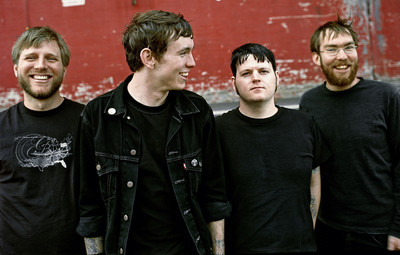Seeking a Connection
Tom Gabel is a restless man, this he'll freely admit. There are times when he feels like a vagabond in his own flesh, and there's an existential antsiness that occasionally creeps into his words like an uninvited houseguest.
But these days, Gabel is perhaps most anxious about the very position he occupies in life.
"People don't trust musicians anymore," says the frontman for politically charged punks Against Me! "A lot of the mystique is gone, a lot of the hero worship is gone, in a weird way."
"I wasn't alive in the '60s and '70s, but it seems to me that what made those bands so important for the times was that people believed in them and the messages they had. It was real, and people felt that connection with them," Gabel continues, standing outside a coffee shop in Oakland. "But today, there's such a mistrust built between musicians and the audience that it's just not making the same connection anymore."
Gabel has long been preoccupied with making this connection as explicitly as possible, and on Against Me!'s latest record, the scalding, superb "New Wave," there's a palpable sense of desperation toward this end, an urgency that pulses through the disc like an adrenaline shot burrowing through flesh.
"We can be the bands we want to hear," Gabel howls on the disc's album-opening title cut, his vocal cords sounding as if they've been with scoured with steel wool. "We can define our generation. Is there anybody on the receiving end?"
Against Me!'s catalog is grounded in this kind of battle-hardened idealism.
On "White People For Peace," the first single from "New Wave," the group detonates a heated anti-war salvo while questioning the ultimate worth of their efforts at the same time.
"Protest songs in response to military aggression / Protest songs to try and stop the soldier's gun / But the battle raged on," Gabel sings on the fist-in-the-air chorus meant to get crowds on their feet.
This kind of commentary was once fairly commonplace in the American mainstream.
When looking back on this country's last great armed conflict in Vietnam, guys like Gabel had a real impact in shaping the public discourse and catalyzing the social tumult that eroded any zeal for war.
When Neil Young sang of tin soldiers and Richard Nixon on "Ohio," when Bob Dylan warned of death planes and big bombs on "Masters of War," they put a human face on the tides of dissent that became all too difficult to ignore.
And who could forget the Molotov cocktail hurled at the establishment by Country Joe McDonald at Woodstock, where 100,000 kids joined him in a bittersweet mocking of the notion of marching off to one's death.
Gabel's cut from the same cloth as these periodic agitators, though he wonders if contemporary artists will ever be able to have a similar impact.
"Take something like Woodstock, for whatever it meant to that period of time, it was real," he says. "If you take something comparable today -- like Live Earth -- the week after it happens the newspapers are running articles on how there's these stars coming out trying to take some stance for the environment when they're riding around in their private jets and making a bigger carbon mark than anybody else in the world."
Gabel sounds increasingly disillusioned as he speaks, and there's this same sense of uncertainty in Against Me!'s records.
Gabel began as something of a folk punk troubadour, a more heavily tattooed Billy Bragg, who performed solo acoustic sets wherever there was an open microphone.
Against Me!'s albums tend to reflect these roots, with spare, yet emphatically kinetic, acoustic-laced tunes that question love and Condoleezza Rice in the same breath, practicing a lived-in populism that favors candor over catchphrases.
The band has a sense of humor -- as evidenced by past song titles like "Even at Our Worst We're Better Than Most," "Pints of Guiness Make You Strong" and "Baby, I'm an Anarchist" -- and they're the first ones to cast a skeptical eye on the very circles they inhabit.
On "New Wave," a much fuller-sounding, straight-up rock record than the band has delivered in the past, they continue their critique of the punk-rock status quo while never putting themselves above the fray.
"Stop, take some time to think, figure out what's important to you," the band urges on "Stop!" a near-disco raver that sounds like a leftist Bee Gees and questions how bands define success.
And while Gabel could be seen as admonishing other groups, he could just as well be addressing himself.
At the end of the day, this is what ultimately defines these dudes: They don't pretend to have all the answers like so many unflinching ideologues, but they know the value in striving for something bigger than themselves, even if they're not always certain just what that may be.
"Sometimes I feel a little lost in a weird way," Gabel says, reflecting on his band's career, which began on a grass-roots, D.I.Y. level and now sees the group signed to a major label. "I'm happy that we're a band that knows what it's like to tour without a cell phone. When we started as a band, I feel like we were at the end of a different period of time, and now we're in a whole new game in a lot of ways.
"My life has been music," he continues, sounding like a true believer. "Ever since I was 8 years old I've wanted to play in a band, and I've spent all my life pursuing that in one way or the other. I believe in music. It means the world to me."
JASON BRACELINMORE COLUMNS
who: Against Me!
when: 7 p.m. today
where: Jillian's, 450 Fremont St.
tickets: $18 (759-0450)






















